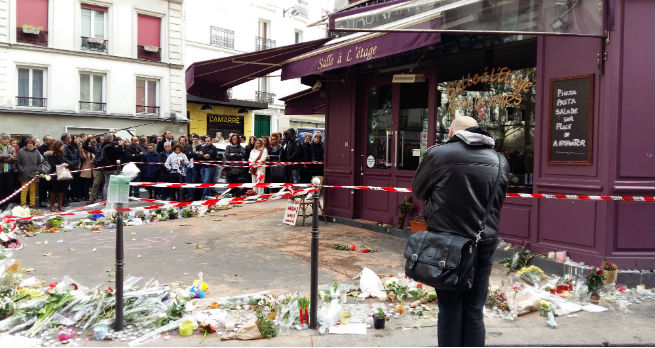Are we at war? What’s certain since the fateful events on Friday night in Paris is that in France we are all targets because of who we are.
The terrorists are not killing us because of the colour of our skin: the victims are all united by the blood they spilled. They are not fighting our religion. Though they may sometimes describe us as “crusaders”, some of the victims of the attacks in Paris were Muslims and a lot were non-believers.
Nor do their motives have the advantage of being linked to a political ideology: Islamic State (IS) works with “the market” when it comes to oil or weapons.
 People gather outside the Casa Nostra, one of the sites of the November 13th attacks
People gather outside the Casa Nostra, one of the sites of the November 13th attacks
Music
But then what is it that makes each of us the target of their blind and appalling cowardice – as a result of which we’re at war?
Beyond the retaliative strikes in Iraq and in Syria, the terrorists reproach us for our way of life. The meticulous choice of the targets on Friday night – confirmed by IS’s statement claiming responsibility for the attacks – reveals the scope of their hatred.
The France vs Germany friendly football match at the Stade de France was a good opportunity to hit the two countries who are the driving forces of the European Union. The terraces of the bars and restaurants that were attacked embody the choice we all have to frequent a public place – or not. The rock concert illustrates that Paris, as IS claims, is: “the capital of abomination and perversions”.
Music, and rock music in particular, seems to be a menace to the terrorists' highly regulated social order, because of its ability to make people move their bodies and give themselves over to its rhythms. It reminds us of the recent film Timbuktu, in which music is severely repressed by Islamists who seize the Malian town.
Liberty
Our liberty is perceived as an “abomination”. Our liberty to go wherever we like, to be entertained by our friends, by sport or by a show, our liberty to create our own identity by the individual choices we all make.
The pleasure of a beer, or a glass of wine, of a friend, a dance, a night out, a good goal – they reproach us all of that. And that we also enjoy a certain economic prosperity of peace.
The tragedy of the attacks in Paris gives us an occasion for our society to pay attention to what makes it what it is – and to how lucky we are to live within it. We’re so used to our liberty that we’ve become divided to such a point that we’ve forgotten what brings us together.
Of course, we can disagree on choices about the economy, morals, education and strategy, but we should recognise that liberty unites us much more than these disagreements divide us.
Positive thinking
It remains for politicians to make speeches that can bring us together. But each of us must also have a positive attitude towards our society, which offers so much liberty and possibility.
Don’t forget what those who wage war on us would like to reduce us to. And don’t forget that it’s the actions of IS that are forcing a mass of refugees to come to Europe.
These fanatical individuals who abuse religion will not win this war because they will not make us give up what we are.
Because we are the targets, we are the soldiers of our own way of life. Continuing to go out, to travel and to live life to the full is a peaceful way of responding to these attacks.![]()
This article was originally published on The Conversation. Read the original article.




Rate and Review
Rate this article
Review this article
Log into OpenLearn to leave reviews and join in the conversation.
Article reviews